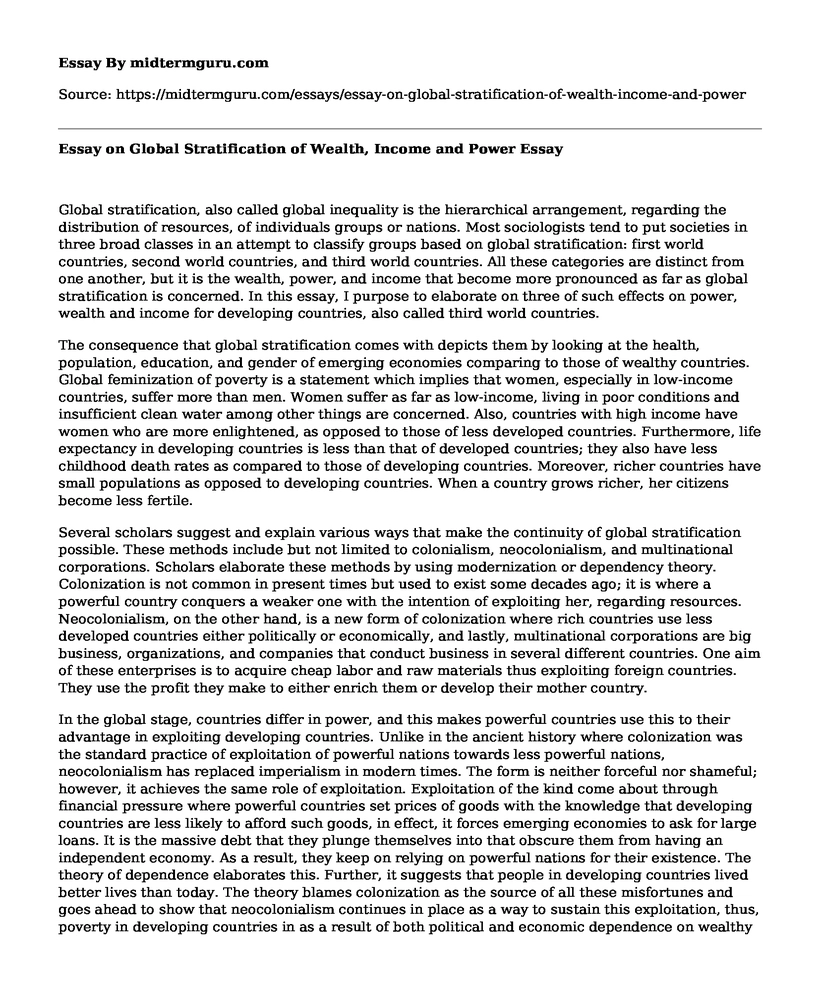Global stratification, also called global inequality is the hierarchical arrangement, regarding the distribution of resources, of individuals groups or nations. Most sociologists tend to put societies in three broad classes in an attempt to classify groups based on global stratification: first world countries, second world countries, and third world countries. All these categories are distinct from one another, but it is the wealth, power, and income that become more pronounced as far as global stratification is concerned. In this essay, I purpose to elaborate on three of such effects on power, wealth and income for developing countries, also called third world countries.
The consequence that global stratification comes with depicts them by looking at the health, population, education, and gender of emerging economies comparing to those of wealthy countries. Global feminization of poverty is a statement which implies that women, especially in low-income countries, suffer more than men. Women suffer as far as low-income, living in poor conditions and insufficient clean water among other things are concerned. Also, countries with high income have women who are more enlightened, as opposed to those of less developed countries. Furthermore, life expectancy in developing countries is less than that of developed countries; they also have less childhood death rates as compared to those of developing countries. Moreover, richer countries have small populations as opposed to developing countries. When a country grows richer, her citizens become less fertile.
Several scholars suggest and explain various ways that make the continuity of global stratification possible. These methods include but not limited to colonialism, neocolonialism, and multinational corporations. Scholars elaborate these methods by using modernization or dependency theory. Colonization is not common in present times but used to exist some decades ago; it is where a powerful country conquers a weaker one with the intention of exploiting her, regarding resources. Neocolonialism, on the other hand, is a new form of colonization where rich countries use less developed countries either politically or economically, and lastly, multinational corporations are big business, organizations, and companies that conduct business in several different countries. One aim of these enterprises is to acquire cheap labor and raw materials thus exploiting foreign countries. They use the profit they make to either enrich them or develop their mother country.
In the global stage, countries differ in power, and this makes powerful countries use this to their advantage in exploiting developing countries. Unlike in the ancient history where colonization was the standard practice of exploitation of powerful nations towards less powerful nations, neocolonialism has replaced imperialism in modern times. The form is neither forceful nor shameful; however, it achieves the same role of exploitation. Exploitation of the kind come about through financial pressure where powerful countries set prices of goods with the knowledge that developing countries are less likely to afford such goods, in effect, it forces emerging economies to ask for large loans. It is the massive debt that they plunge themselves into that obscure them from having an independent economy. As a result, they keep on relying on powerful nations for their existence. The theory of dependence elaborates this. Further, it suggests that people in developing countries lived better lives than today. The theory blames colonization as the source of all these misfortunes and goes ahead to show that neocolonialism continues in place as a way to sustain this exploitation, thus, poverty in developing countries in as a result of both political and economic dependence on wealthy countries.
Modernization theory is another way of explaining how multinational corporations are in place to exploit the developing countries. The theory suggests that economic development involves a process. For developing countries to develop, they need to welcome new technologies. Also, the theory stipulates that it is to the disadvantage of developing countries to desist from adhering to customs and even traditional values because it makes them poor competitors in the face of modern economies, locally and globally. Multinational corporations come from powerful and wealthy countries. Their establishment in developing countries gives them a cutting edge over local businesses thus enjoying a market that makes them appear monopolistic. A system like this seems unfair to emerging economies even though there are no legal bases to form a case against wealthy countries dominance as a result of power or wealth.
As part of remedy to global stratifications, it is advisable for rich countries to introduce modern technologies to developing countries and educate developing countries on the need for population control. In addition to that, they have to stop neocolonialism and unfair competition with developing countries. Women, who form a greater percentage of poor people in the world, need to be enlightened, in particular through education. All these recommendations serve to rectify adverse effects that come with global stratification. In conclusion, global stratification causes inequality in living conditions across the globe as a result of the difference in countries power, wealth and income. Modernization theory and dependence theory show that it comes as result of neocolonialism, colonization and multinational corporations among other factors. Women and developing countries suffer in effect; however, some things can be done to correct these inequalities.
Cite this page
Essay on Global Stratification of Wealth, Income and Power. (2021, May 26). Retrieved from https://midtermguru.com/essays/essay-on-global-stratification-of-wealth-income-and-power
If you are the original author of this essay and no longer wish to have it published on the midtermguru.com website, please click below to request its removal:
- Sustainability of Pay Equity Essay Example
- Essay on the Recent Welfare Reform Research Findings by Fremstad
- Adolescent Pregnancy - Sex Education Essay Sample
- Research Paper on Feminist Literature
- The Roles and Rights of Women in Ancient Greece vs. Ancient Rome - Paper Example
- UK Government Investing to Improve LGBT Rights - Essay Sample
- Poverty: America's Poor Concentrated in Rural Areas - Essay Sample







